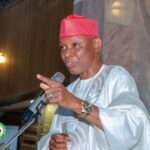As I gleaned from the discussion with my Jewish American friend, the IMF is to US international economic relations what the Central Intelligence Agency (CIA) is to US political, strategic and diplomatic policy.
The IMF, along with the International Bank for Reconstruction and Development (more commonly known as World Bank) and the CIA, were some of the institutions established by the US to manage its new found dominance of the world after the Second World War.
In the case of the IMF, shorn of the usually obtuse and deliberately obfuscating financialese, the Fund favours in reporting about itself and its activities, it is, in reality, a ruthless enforcer of the global economic interests of the US. And as a cat’s paw in this role, the IMF targets the economic sectors of especially developing countries in order to principally ensure the constant flow of capital into the US economy.
Why is this so?
Many are led to believe rather erroneously that the US with its vast resources and technological advantages can run its economy largely without needing resources from other countries. On the contrary, the logic of the US economic structure is such that it requires the constant flow of capital from abroad to fund its ever-burgeoning budget deficits incurred through borrowing to spend on its various activities.
One of the lessons US economic planners learnt from the great depression which preceded the Second World War was the stoppage of foreign capital inflows as protectionist policies took rein in the 1930s. As the US emerged victorious from the war and subsequently in control of the global economy, US economic policy planners further realised that maintaining US global dominance and living standards required the acquisition and control of resources globally at comparatively cheap, almost give-away prices, as well as the constant inflow of capital and financial resources from around the world.
And that is what the IMF was principally established to pursue on a global scale. And among the principal tools the IMF deploys in this are; compelling countries to remove subsidies, currency devaluation and trade liberalisation.
The presentations often given by IMF apostles on the fund’s policies are usually couched in abstract terms to disguise their real intentions. But in reality, the whole package of prescriptions from the IMF is nothing but a template for economic warfare designed to raid the economic fortunes of countries like Nigeria, impoverish them and ultimately, push them into more dependency thereby preventing them from taking the path of independent national development.
Take the removal of subsidies for example. When a country is compelled to remove subsidies, the ostensible explanation is that it is to aid efficient economic management and to channel the monies saved to needy services. But the smart folks at the IMF know too well that monies saved will not go into those areas. The monies will eventually end up abroad in numbered accounts by those whose responsibility it is to efficiently manage the resources saved from subsidy removal.
From our experience each time subsidies are removed it breeds a corresponding decrease in the quality of education, health, infrastructure and general living standard of the people. Compare for instance our pre-subsidy removal educational, health and infrastructure situation with the post-subsidy removal situation of these very sectors.
But what is more, each subsidy removal breeds a class of rapacious officials who hide under the need to comply with IMF conditionalities to rid themselves of the constitutional and moral responsibilities they undertook to provide for the people.
The IMF, which was forcibly compelling in getting the subsidies removed, now contrives to look the other way as huge tranches of capital are sucked up continuously from the country to the financial systems of the Western industrial powers to fund their budgets and expenditure. To the extent that subsidy removal results in continuous transfer of resources from countries like Nigeria to the financial systems of the Western countries even without transparency and accountability leaving in its trail, poverty and uncertainty, the IMF which ironically talks glibly about efficiency in economic management of resources, does not bother one jot.
As the IMF knows, no country exists without subsidies. Right there in the US where the IMF is situated, it knows that there are subsidies in every sector and layer of the US economy. The IMF further knows that the subsidies embedded in the US economy are meant as the shock absorbers of the entire economic and social system without which the country would collapse.
Similarly in France, no government whether of the socialist, centre, or conservative hue can afford to remove subsidies on agriculture. There is even a bank called Credit Agricole established to funnel subsidies to French farmers. It will be catastrophic for any government to attempt to reduce state subsidies. The Airbus planes made in the city of Toulouse will perhaps never fly were it not for subsidies.
In Britain, even the arch-conservative Margaret Thatcher, despite herself, thought it wise not to uproot the National Health Service, NHS, as she promised before ascending power.
The IMF knows all this and chooses to look the other way. But as regards developing countries, especially in Africa where indeed subsidies are needed most, the IMF pretends subsidies are anathema and asks that they be removed.
Why this contradiction?
As my Jewish American banker friend said to me 39 years ago when Nigeria was on the cusp of talking with the IMF, the removal of subsidies from developing countries is one of the principal ways by which the IMF keeps capital flowing into the US and western industrialised countries. Indeed it must be said that it is developing countries like Nigeria that collectively subsidise the western industrialised countries through the IMF policies which ensure the constant flow of resources and capital to those countries.
So what is to be done?
Government must not allow itself to be persuaded that the IMF has the final word in economic management. Why do we have to outsource to the IMF our thinking and action platforms on Economic planning and policy implementation?
In addition to the existing social and economic think tanks in the country, there are scores of departments of economics in our various universities. Can’t they be tasked to provide us with homegrown templates and solutions to our economic challenges that reflect our realities? What happened to the Ojetunji Aboyade template on economic development?
Secondly, government should not just tell us subsidies, which provide us with necessary social and economic shock absorbers, needed to be removed because certain unidentified persons and groups were sabotaging it. It is observed that our governments are always hasty in withdrawing subsidies but curiously slow in going after those it knows and identifies as ‘’subsidies abusers’’. It is the duty of the government to identify those engaged in this act of economic sabotage and sanction them appropriately. The Nigerian people should not be punished for the infractions of a few.
Thirdly, IMF not being a Nigerian institution should not have such an overbearing influence in Nigerian economic management. If there is a need to sit and talk with the IMF it must be on the basis of quid pro quo not on its assumed superiority on economic matters on Nigeria. Let the IMF tell us what it can do for us realistically and honestly in terms of economic support not hand us economic diktats that harm us the more and benefit only its principals. (Concluded)

 Join Daily Trust WhatsApp Community For Quick Access To News and Happenings Around You.
Join Daily Trust WhatsApp Community For Quick Access To News and Happenings Around You.


